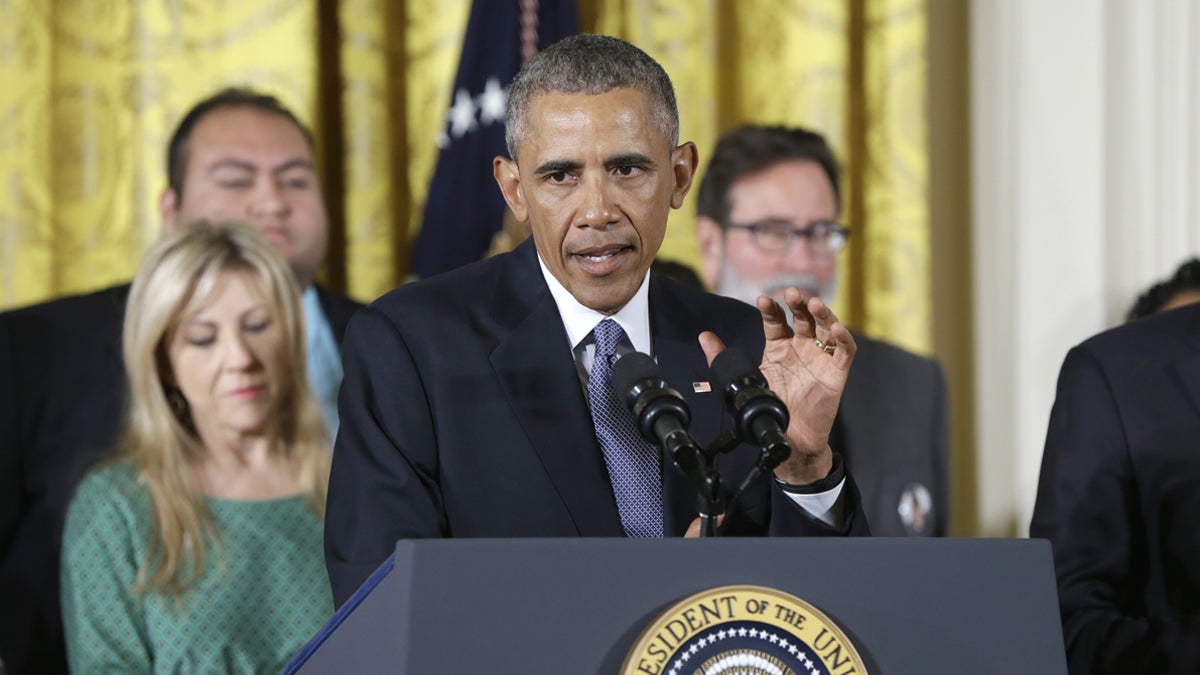Obama and Congress: Shootout at Dysfunction Junction

President Barack Obama, joined by gun violence victims, speaks in the East Room of the White House in Washington, Tuesday, Jan. 5, 2016, about steps his administration is taking to reduce gun violence. Also on stage are stakeholders, and individuals whose lives have been impacted by the gun violence. (Carolyn Kaster/AP Photo)
There are two ways to assess President Obama’s surprise weekend decision to seek congressional authorization for a military strike on Syria: (1) It’s very shrewd, because it challenges Congress to govern as an equal partner, to co-own a crucial security commitment, or (2) It’s very insane, because it cedes his life-and-death decision to the denizens of Dysfunction Junction, who can’t even get it together to fix our roads.
Take your pick, but I vote for both.
Obama is essentially telling Congress, “You no longer have the luxury of carping on the sidelines. You are now required to get into the game, sift the evidence, debate and deliberate, and go on the record. Let’s show the world that we’re united on punishing a regime that uses weapons of mass destruction. But if you vote for disunity, and signal to the world that America is irresolute, then it’s on you.”
Or, as Secretary of State John Kerry said yesterday, while touring five Sunday shows, “The United States is strongest when the Congress speaks with the president.”
But Obama’s eleventh-hour strategy is quite a roll of the dice, given how Congress – and especially the Republican House – has cuffed him around on everything from gun safety to global warming. Why should its treatment of the Syria decision be any different? Are we to assume that a weighty matter of war and peace will nudge lawmakers onto the high road? Obama is seeking approval from a semi-rational institution that he assailed in a speech just five weeks ago – when he complained that the “gridlock has gotten worse,” thanks to “an endless parade of distractions” and “political posturing.”
The problem is, there are so many factions on Capitol Hill, you need a cheat sheet to keep them straight. And strange bedfellows abound, because the factions on the Syria issue breach the traditional partisan divide.
On the pro-war side, neoconservative Republicans (who favor American muscularity abroad) are roughly allied with interventionist liberal Democrats (who are sickened by the Syrian regime’s chemical killing of civilians). On the flip side, libertarian Republicans (who see American interventionism as financially wasteful) are roughly allied with anti-war liberal Democrats (who warn of a slippery-slope quagmire), plus the reflexive Obama-haters who’d probably oppose an Obama war initiative even if Syria sent terrorists to bomb McMansions in suburbia.
How Obama figures to get a war authorization majority in both chambers, given the cross-partisan state of play, is anyone’s guess. And I haven’t yet mentioned some of the nuances.
Neoconservatives can generally be expected to OK Obama’s contemplated cruise missile strike(s), but Sen. John McCain and his faithful Tonto, Lindsey Graham, are already insisting that Obama’s war authorization language is not hawkish enough; predictably, they’re demanding regime change in Syria as a potential condition for their Yes votes. On the flip side, Senate Democratic leaders say that the White House language is too hawkish, too open-ended, and that the scope needs to be narrowed in order to ensure passage.
Plus, Congress doesn’t deem a war-and-peace crisis to be sufficient reason to cut short its long vacation. It won’t be back until next Monday, and only then will we begn to hear the usual cacophony of voices. I get why Obama wants everyone to share the responsibility of crisis governance; a Yes vote in both chambers would give him more political cover. But I suspect that weeks of congressional gridlock could be interpreted by our enemies – in Syria, Iran, North Korea, and elsewhere – as a welcome case of American fecklessness.
And one key question has yet to be answered: If Congress refuses to give its blessing, would Obama bomb Syria anyway?
The administration says he already has the power to do it, so why wouldn’t he – given the regime’s breach of international norms and its “moral obscenity” (as Kerry calls it)? Or would Obama retreat from his own words (the vow to act if chemical weapons were ever used) and blame Congress for tying his hands? But would a congressional rebuke enhance his international standing?
On Meet the Press yesterday, Kerry was asked what would happen if Congress votes No. His response (which he repeated on all the shows): “I do not believe the Congress of the United States will turn its back on this moment.”
Which didn’t answer the question. Which tells us plenty.
——-
Follow me on Twitter, @dickpolman1
WHYY is your source for fact-based, in-depth journalism and information. As a nonprofit organization, we rely on financial support from readers like you. Please give today.

